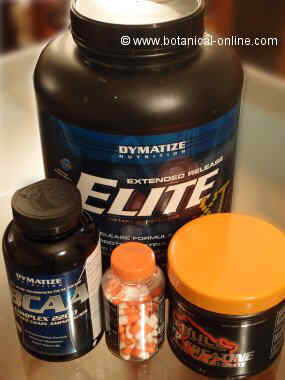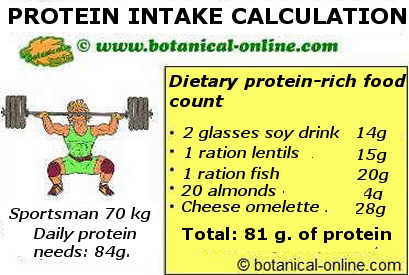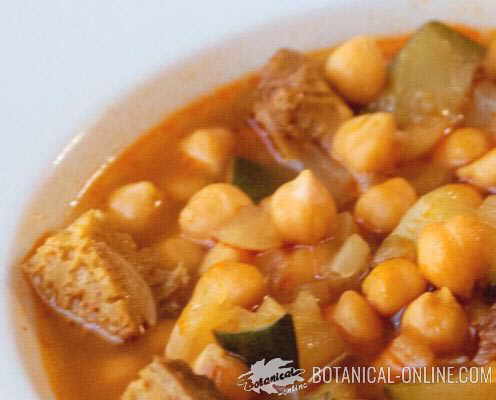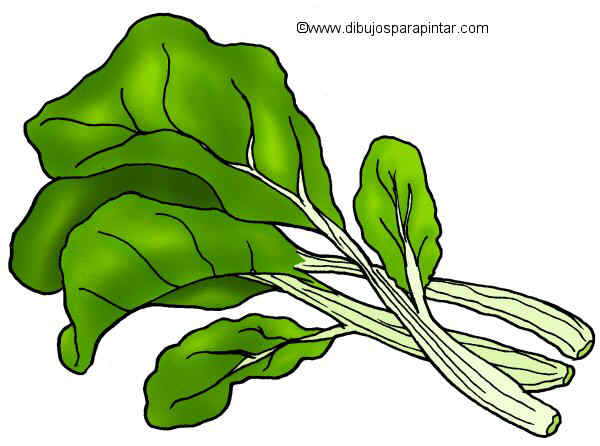Contents
- 1 How many proteins should an athlete eat?
- 1.1 IMPORTANCE OF PROTEINS IN SPORTS
- 1.2 Why do athletes need more protein?
- 1.3 How many proteins does an athlete need?
- 1.4 How to calculate the proteins that an athlete needs?
- 1.5 Once I know the grams of protein, how do I ingest them?
- 1.6 How do you get the extra protein an athlete needs?
- 1.7 Do you ever need an extra amount of protein?
- 1.8 Protein supplements: Is the use of hyperprotein supplements mandatory?
- 1.9 Essential amino acids and non-essential amino acids for sport
- 1.10 List of amino acids in food
How many proteins should an athlete eat?
IMPORTANCE OF PROTEINS IN SPORTS

|
Why do athletes need more protein?
In athletes, the protein needs are increased with respect to those of individuals with a sedentary lifestyle.
This increase in requirements is related to the increase in muscle mass, its development and physical exhaustion.
This does not imply that an excess of protein should be ingested, as this fact, by itself, does not ensure an increase of the muscular mass of the person doing sport.
A combination of increased protein intake in conjunction with a planned physical exercise, adapted to our particular abilities and needs, will provide this effect.
How many proteins does an athlete need?
The recommended amount of protein is directly related to the type of exercise, its intensity and its frequency.
Protein recommendations will vary depending on whether it is an exercise in strength, resistance or speed, and according to the intensity level in which it is practiced.
The amount needed differs greatly between an amateur and a professional. Or even more in a competitive athlete.
The amount also depends on how many times you do that exercise in a specific period of time, to the day, to the week, to the month,…
How to calculate the proteins that an athlete needs?
You can calculate the requirements of protein intake based on the weight of a person:
- In non-athletic healthy adults,Each kilogram of individual weight will be multiplied by 0.8 or up to a maximum of 1 grams of protein. This result gives the protein needs. For example, a person weighing 60 kg. will need 48g. of protein per day (60 x 0.8 = 48)
In the case of athletes, it will depend on the type of sport they do. The general rule is as follows:
- If they are resistance sports, aerobic exercises, team sports, etc., the protein intake should remain between 1.2 and 1.5 grams of protein per kilogram of weight of the athlete per day.
- If they are sports where in addition to resistance also demand speed, the contribution will oscillate between 1.5 and 1.7 grams of protein per kilogram of weight of the athlete a day.
- Sports resistance and strength or only strength, from 1.5 to 2 grams of protein per kilogram of weight of the athlete per day.
- In extreme long-term sports, such as a marathon or triathlon, even for several days like the well-known “Ironman” that can be considered as a training that involves a lot of force constantly, the requirements are placed in 2 – 2, 5 grams of protein per kilogram of weight of the athlete per day.
To do the calculation, for example, if a person weighs 70kg and performs a physical exercise that requires a protein of 1.2 grams, such as swimming, should consume 84 grams of protein distributed over the same day.
 |
| Example of dietary calculation of foods rich in protein. The diet should not be exclusive in protein foods, but it is necessary to ingest vegetables, fruits and all food groups (not just those rich in protein) to meet the nutritional requirements of the body, such as vitamin C, E, vitamin B, magnesium, calcium, etc. |
Once I know the grams of protein, how do I ingest them?
Practical example:
- Sportsman 70 kg. With moderate to high exercise daily
- Requirements: 1.2 grams of protein daily per kg of body weight
- Daily protein requirements: 84 g. Daily Protein
| Ration | grams of protein per ration |
| 1 beef steak (100g) | 20 |
| Chicken breast (125g) | 20 |
| 1 serving of fish (150g) | 20 |
| 1 egg | 8g |
| 2 slices of turkey (20g) | 3g |
| 2 slices cured cheese (40g) | 12g |
| 1 jar of fresh cheese (75g) | 12g |
| 1 natural yogurt (125ml) | 4g |
| 1 glass of milk (200 ml) | 7g |
| 1 cup soy drink (200ml) | 7g |
| Lentils (70g) | 15g |
| Almonds (20 units) | 4g |
| 1 protein package (28g) | 14g |
* More information on How to calculate proteins for sport.
How do you get the extra protein an athlete needs?

|
Considering animal food, food sources with the highest proportion of proteins are meat, fish, eggs and dairy products,
The protein sources of vegetable origin are legumes (which also contain a lot of magnesium) and nuts.
Protein-rich supplements may be brewer’s yeast, pollen, or wheat germ (although we must bear in mind that they do not only contain this macronutrient).
Do you ever need an extra amount of protein?
In certain situations, an increase in specific needs is required, such as a marathon or triathlon, etc. In these situations, an extra contribution must be made prior, during and after exercise. The food ingested must be of high quality, easy assimilation and absorption, not to generate deficiencies and to perform to the maximum.
In other activities of lesser intensity, these extraordinary contributions are mostly not necessary, and with contributions ranging from 10% to 15% of the total daily calorie intake, is completely sufficient.
* More information: Does protein fatten?
Protein supplements: Is the use of hyperprotein supplements mandatory?
Hyperproteic supplements are not considered necessary when they provide an excess of the really unnecessary protein, because the person ingests sufficient proteins through the diet.
Protein supplements may be needed in case of:
- Having special protein needs.
- Insufficient food intake
We must take into account the multiple and possible negative effects of an excessive intake of proteins, such as acidification and decalcification of our body, which can trigger future diseases such as osteoporosis.
Essential amino acids and non-essential amino acids for sport
There are 9 essential amino acids that the body can not make them by itself. These amino acids must be obtained through the food we eat.
Nonessential amino acids can be synthesized by the body without having to include them in the diet, from other amino acids or substances.
List of amino acids in food | |
Essential amino acids | Nonessential amino acids |
Phenylalanine, Isoleucine, Leucine, Lysine, Methionine, Threonine, Tryptophan, Valine | Aspartic acid, Glutaminic acid, Alanine, Arginine, Cysteine, Cystine, Glycine, Hydroxyproline, Proline, Serine, Tyrosine |
* Related information:
An ideal fruit for doing sports
Acai, ideal food for athletes,
Weekly diet for competition and training
![]() More information on natural vegetarian food for sport.
More information on natural vegetarian food for sport.








